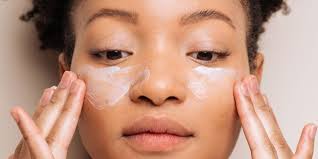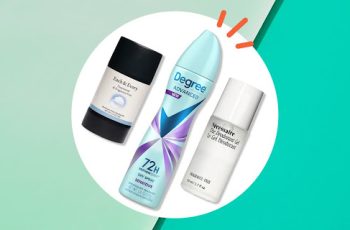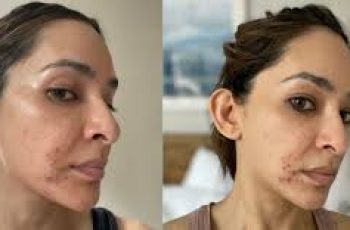
Rosacea Skin-Care Game Changer: 6 Steps to Calming, Protecting Skin
If you’ve recently noticed that the skin on your face is constantly red, flushed, and feeling extremely tender, you may have an inflammatory skin condition called rosacea. If that’s the case, don’t panic: The condition is common, and while there’s no complete cure, it can be managed by avoiding things that irritate the skin, taking medication when necessary, and adjusting your skin-care routine. To bring you up to speed on the latter, we asked two board-certified dermatologists for their top skin-care tips for rosacea, and they emphasized taking a gentle, moisturizing approach. Read on to learn the six most important considerations when building a rosacea-friendly skin-care routine, from which products to use to when to consult a dermatologist.
Meet the Experts
Purvisha Patel, MD, is a board-certified dermatologist and founder of Advanced Dermatology and Skin Cancer Associates and Visha Skincare in Memphis.
Deeptej Singh, MD, is a board-certified dermatologist and founder of Sandia Dermatology.
Symptoms of Rosacea
Wondering if you have rosacea? When someone has this common skin condition, they may experience the following symptoms:
Sensitive skin
Dry nose and cheeks
Blushing
Redness on the face
Burns on the skin
Pimples
Clearly visible blood vessels on the surface of the skin
Of course, many of these symptoms can have other causes as well. The best way to find out if you have rosacea is to consult a dermatologist. However, many of the best skin care tips for rosacea require a gentle, low-key approach. So, you can usually feel safe trying them whether you have a diagnosis or not.
Best Skin Care Tips for Rosacea
01
From 06
Know Your Triggers
In order to create a skin care routine that won’t further aggravate rosacea skin, you should first understand your triggers, or factors that make symptoms worse. These triggers vary from person to person, but the most common include stress, heat, cold, wind, alcohol, pollution, sunlight, certain skin and hair products, and foods like dairy, chocolate, and spicy foods. 1 If your skin has these triggers, it may become irritated and inflamed if exposed. So, if you know what typically aggravates rosacea, you should do your best to avoid it.
While avoiding triggers may help, keep in mind that this approach isn’t completely foolproof. “For some patients, rosacea is manageable by carefully avoiding triggers,” says board-certified dermatologist Deeptej Singh, MD. “Others, however, may find that avoiding triggers alone isn’t enough to manage their condition.”
02
Starting in 2006
Practical Gentle Cleansing
If you have rosacea, gentle cleansing is crucial—especially since your skin is inflamed, and you don’t want to do anything that will further irritate it. “Over-cleansing can cause irritation,” says Singh. “Often this is more about removing makeup that’s been applied to the skin than satisfying an inherent need for cleanliness.”
Nationally certified dermatologist Dr. Purvisha Patel recommends cleansing twice a day with warm water and a gentle cleanser, and emphasizes that people with rosacea should avoid scrubbing. Singh says how often you clean may vary depending on your skin and symptoms, so be sure to check with your dermatologist and assess how your skin feels regularly. “The type and severity of rosacea varies from person to person, and a person’s tolerance for cleansing can change over time,” he tells us. Here are some tips for choosing a gentle cleanser:
Choose a gentle formula: Look for cleansers and soaps that are labeled as gentle or suitable for sensitive skin, such as face washes like Cetaphil or Cerave.
Watch out for niacinamide: Cleansers that contain niacinamide may be helpful for some people with rosacea. This ingredient can reduce inflammation and protect the skin from environmental stressors.
Consider some synthetic ingredients: Detergents made from synthetic detergents (rather than soaps) may help relieve rosacea symptoms in some people because they are less irritating. It may sound counterintuitive, but the acidic pH of these types of cleansers may be better suited to the skin’s natural acidity.
03
Since 06
Focus on hydration and barrier repair
Hydration is important for people with rosacea because it has a variety of potential benefits, including repairing the barrier, maintaining the skin microbiome, and maintaining pH balance. “Keeping the skin moisturized can reduce inflammation and help relieve the itching and discomfort caused by rosacea,” explains Patel. “It also repairs the barrier so the nerves aren’t exposed to air.”
Are you searching for a moisturizer that’s safe for your rosacea skin? The dermatologists we spoke to recommend trying a product that’s noncomedogenic, pH-balanced, and contains ceramides. These help protect and repair the skin. Products with hyaluronic acid or azelaic acid can also help.
04
Starting in 06
Use a good SPF
While sun protection is absolutely necessary for everyone, it’s especially true for people with rosacea, as UV rays can trigger and exacerbate irritation and inflammation. “Applying sunscreen can help prevent inflammation in rosacea,” says Patel.
When it comes to finding the right SPF for rosacea (especially if this is one of your known rosacea triggers), we have a few tips:
Look for an SPF 30 or higher: To avoid sun irritation, you need adequate protection. It’s best to choose a formula with SPF 30 or higher and reapply throughout the day.
Opt for a mineral formula: Try a physical sunscreen with titanium oxide or zinc oxide. These products are generally less inflammatory than chemical sunscreens.
05
Starting in 2006
Avoid irritating products
If you have rosacea, your skin barrier may be compromised, and makeup and skincare products with irritating ingredients can easily irritate your skin and inflame it. For example, “people with rosacea, eczema, or skin conditions shouldn’t use medicated skincare or exfoliating toners, as these may make the condition worse,” Patel says. Instead, she recommends looking for ingredients like:
Sea buckthorn oil: This helps heal inflamed skin.
Niacinamide: As mentioned above, this ingredient has soothing and antimicrobial/antibacterial properties that can be very helpful for people with rosacea or other skin irritations.
Hyaluronic acid: This moisturizer can help restore moisture without locking it in.
06
Starting in 2006
Ask your dermatologist
Like any other skin condition — especially if you haven’t been diagnosed yet — it’s important to see a licensed dermatologist if you have any questions or concerns about rosacea. He can assess your symptoms and use his expertise to develop a specialized treatment plan for you. This step is especially important because the best rosacea treatments are not the same for everyone.
Of course, it’s also important to see your doctor to make sure the suspected condition is indeed rosacea. “It’s important to recognize that not all facial redness is rosacea,” says Singh. “If treatment isn’t working, this may indicate a need to reevaluate the diagnosis.”
Conclusion
Rosacea can be frustrating and uncomfortable, but the good news is that you can relieve some of the irritation by identifying your triggers and choosing gentle, simple habits. While you should see a dermatologist to confirm whether you have the condition and see if they can advise you on the best daily care routine, skin care for rosacea is generally designed to moisturize, protect, and reduce rosacea flare-ups, so most of the steps above can help with a range of sensitivities.


